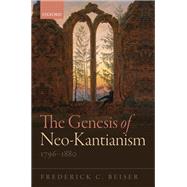
The Genesis of Neo-Kantianism, 1796-1880
by Beiser, Frederick C.Buy New
Rent Textbook
Rent Digital
Used Textbook
We're Sorry
Sold Out
How Marketplace Works:
- This item is offered by an independent seller and not shipped from our warehouse
- Item details like edition and cover design may differ from our description; see seller's comments before ordering.
- Sellers much confirm and ship within two business days; otherwise, the order will be cancelled and refunded.
- Marketplace purchases cannot be returned to eCampus.com. Contact the seller directly for inquiries; if no response within two days, contact customer service.
- Additional shipping costs apply to Marketplace purchases. Review shipping costs at checkout.
Summary
Author Biography
Frederick C. Beiser, Syracuse University, New York
Frederick C. Beiser was born and raised in the US, and studied in the UK at Oriel and Wolfson Colleges, Oxford. He also studied in Germany and lived in Berlin for many years, receiving stipends from the Fritz Thyssen Stiftung and the Humboldt Stiftung. He has taught in universities across the US, and is currently Professor of Philosophy at Syracuse University, Syracuse, New York. Beiser is the author of Schiller as Philosopher (OUP, 2005), Diotima's Children (OUP, 2009), The German Historicist Tradition (OUP, 2011), and Late German Idealism (OUP, 2013).
Table of Contents
General Introduction: Defining and Re-Examining Neo-Kantianism
Part I
Introduction: The Lost Tradition
1. Jakob Friedrich Fries and the Birth of Psychologism
2. Johann Friedrich Herbart, Neo-Kantian Metaphysician
3. Friedrich Eduard Beneke, Neo-Kantian Martyr
4. The Interim Years
Part II
Introduction: The Coming of Age
5. Kuno Fischer, Hegelian Neo-Kantian
6. Eduard Zeller, Neo-Kantian Classicist
7. Rehabilitating Otto Liebmann
8. Jurgen Bona Meyer, Neo-Kantian Skeptic
9. Friedrich Albert Lange, Poet and Materialist Manque
10. The Battle against Pessimism
11. Encounter with Darwinism
Part III
Introduction: The New Establishment
12. The Young Hermann Cohen
13. Wilhelm Windelband and Normativity
14. The Realism of Alois Riehl
Bibliography I: Primary Sources
Bibliography II: Secondary Sources
An electronic version of this book is available through VitalSource.
This book is viewable on PC, Mac, iPhone, iPad, iPod Touch, and most smartphones.
By purchasing, you will be able to view this book online, as well as download it, for the chosen number of days.
Digital License
You are licensing a digital product for a set duration. Durations are set forth in the product description, with "Lifetime" typically meaning five (5) years of online access and permanent download to a supported device. All licenses are non-transferable.
More details can be found here.
A downloadable version of this book is available through the eCampus Reader or compatible Adobe readers.
Applications are available on iOS, Android, PC, Mac, and Windows Mobile platforms.
Please view the compatibility matrix prior to purchase.
